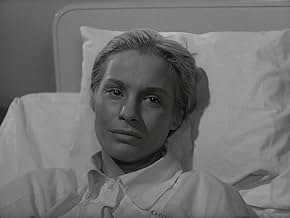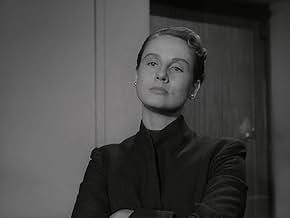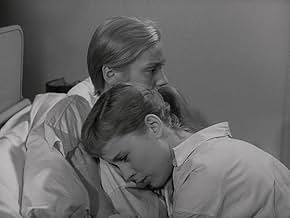Adicionar um enredo no seu idiomaThree women in a maternity ward reveal their lives and intimate thoughts to each other, where they face the choice of keeping their babies or offering them for adoption.Three women in a maternity ward reveal their lives and intimate thoughts to each other, where they face the choice of keeping their babies or offering them for adoption.Three women in a maternity ward reveal their lives and intimate thoughts to each other, where they face the choice of keeping their babies or offering them for adoption.
- Direção
- Roteiristas
- Artistas
- Prêmios
- 3 vitórias e 1 indicação no total
- Sjukvårdsbiträde
- (não creditado)
- Fader med skadat barn
- (não creditado)
- Hjördis väninna
- (não creditado)
- Maud - Sjuksköterskeelev
- (não creditado)
- Fru Jönsson - Nybliven mor
- (não creditado)
- Nattsköterskan
- (não creditado)
- Marit - Sjuksköterska
- (não creditado)
- Doktor Larsson
- (não creditado)
- Doktor Thylenius
- (não creditado)
Avaliações em destaque
What transforms this movie is the astonishing performances that Bergman is able to obtain from the actors. It's something that is so frequent in the first half of his career. There's something vibrant and remarkable, that transcends plot. You can see why he became so famous. Very few directors seem to be able to obtain such spontaneous performances from their actors.
Like so many of his early films, there's not much here that you might not see in the theatre. Yet it has such remarkable life to it.
Eva Dahlbeck, Ingrid Thulin and Bibi Andersson are immense as the three ladies in the maternity ward revealing their thoughts and their secrets.
Seeing it again after 50 years and on the centennial of Ingmar Bergman's birth. it roused an enormous interest in Bergman's other early films from the 50s, which used to be his best, but this is still for me number one.
As the two previous reviewers have observed, this little-mentioned film is a classic of its own, dealing with a most challenging and difficult phase of life undeservedly neglected by directors, male or female. Numerous thoughts passed through my mind while viewing it. For those who have experienced some of the events in the film, it rings true. Bergman, with the assistance of the excellent script by Ulla Isaksson, is able to penetrate female psychology about this very elemental subject and to elicit powerful and honest performances from all of his actors. To say that Bergman proves himself to be both psychologist and psychiatrist of the female psyche would not be an exaggeration. But here in 1958 he feels no need for the pathology of "Cries and Whispers," or the sexual neuroses of "Persona."
The setting is "given," almost like a stage play, as it takes place in mainly two rooms of a hospital, and the situation of each of the three women, while different, might even seem a tad "set" or "canned." But as their situations unfold, and as we are drawn into each dilemma, we see how vital this inter-action is between them, between them and the head nurse, and between each of their spouses and lover. From the intensity of being alone (as we see in vivid closeups), their circle of life is gradually drawn wider, encompassing others and us in it. Ultimately, we see how this inter-action deeply affects each of them.
From the standpoint of film making, we can feel how much Bergman loved the archetype Woman, and felt compelled to present in as straightforward and sympathetic a way possible, without melodrama or sentimentality, her predicament as Child-bearer. We are given insight into her innermost fears (what woman has not feared pregnancy before marriage, or a miscarriage, or an abnormal or still birth, an indifferent lover or spouse?), and we are shown how some kind of closure or resolution might be offered through an honest reaching out and sharing of those fears with someone who listens and sympathizes without judgment. Bergman's genius was the ability to reach into the female psyche, to gain the trust of his actors, to allow them to reveal themselves in this most intimate and personal of human emotions and acts, and to make a statement about greeting and accepting life as well as death. He must have obtained this insight early on in life, and for that gift we must thank his mother Karin.
One final note about the men in these women's lives. Ingrid Thulin is matched with Erland Josephson, Eva Dahlbeck with Max von Sydow, and Bibi Andersson speaks on the phone with her lover. Both Josephson and Sydow look very young, much younger than the women appear. Josephson plays a role we seldom see him in, that of the rather unsympathetic spouse, a bit too caught up in himself and appearances.
His sister, interceding for him, is the beautiful and strong, but rarely seen Inga Landgr~{(&~}. Max von Sydow plays a young, very young husband to Dahlbeck -- he seems almost like an adolescent here, even though he was in the "Magician" the same year and "Seventh Seal" the year before. Bibi's errant young man is suitably absent
If we are to read their roles as legitimately portrayed, then I wonder what Bergman was trying to say about Man vis a vis Woman during this phase of pregnancy and childbirth? I hesitate to speculate, but it is almost one of helplessness, even fecklessness, in the face of a life force that is greater than himself.
In all a film of **** well worth searching for and best seen in company with "Karin's Face" if at all possible. I would recommend that all medical students see it, and anyone contemplating childbirth.
Você sabia?
- CuriosidadesThere is no musical score, just a few bars from a radio at 10.55 pm. The tune played is Sweden's national anthem indicating the end of the broadcast that day.
- Citações
Hjördis Petterson: They think I'm horrible. I think so too. I think I'm horrible. I don't want to answer like I do, but the words just fall from my lips. I bite their heads off although I don't mean it. Then at night when I can't sleep I get so angry with myself. Everything just keeps growing and growing. And I always end up at the very bottom. Whatever I do, things just go wrong. I don't know what to do.
Principais escolhas
- How long is Brink of Life?Fornecido pela Alexa
Detalhes
- Tempo de duração1 hora 24 minutos
- Cor
- Mixagem de som
- Proporção
- 1.37 : 1
Contribua para esta página


































